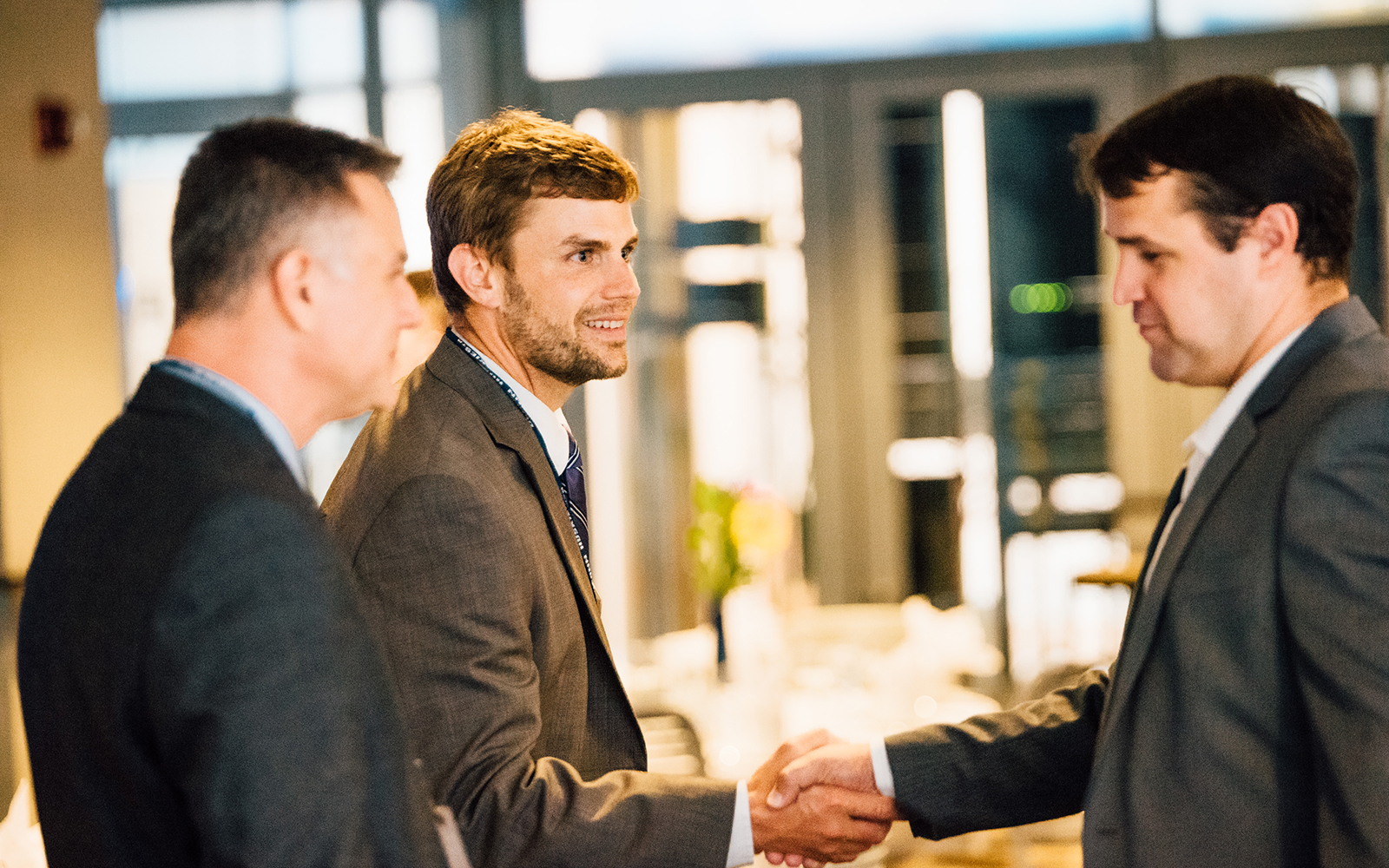
Shaun Anderson ’16, a retired Navy petty officer first class, started a sound, lighting and audio-rental company in his garage in Vernon, Conn. Now “Off the Ground Sound” has moved to a storefront, and he’s considering expanding to more locations.
Dusten Sayes of Raleigh, NC, wants to own a LEGO store that will also offer after-school and community programs. “If I could do any job I wanted to, that is it,” said Sayes, who just retired as a logistics manager with the U.S. Army after 21 years of service. “Why not do something I love and share it with others?”
The two veterans are among 20 enrolled in the UConn School of Business’ Entrepreneurship Bootcamp for Veterans (EBV), which kicked off its ninth annual program on Aug. 9. The veterans will spend 10 days at UConn learning about entrepreneurship and small-business management from UConn faculty and other industry mentors.
The UConn program is one of only 10 in the country serving veteran entrepreneurs. In 2017, UConn was ranked as one of the top veteran-friendly universities and business schools in the nation.
This year’s class draws 15 men and five women; 10 from Connecticut and others traveling from as far away as Arizona and Florida. All branches of the military are represented. Each veteran admitted to the program must have an exemplary military career. The 2018 class includes five veterans awarded six Bronze Stars for valor and two veterans awarded the Purple Heart. Five participants have master’s degrees, nine have bachelor’s degrees and two have associate’s degrees. Eighteen of them served in Iraq, Afghanistan or other combat theaters.
The program has made a tremendous impact on the veteran community, said program director Michael Zacchea, a decorated U.S. Marine Corps veteran.
“The UConn EBV program has developed an enviable record of helping post-9/11 veterans re-enter the civilian workforce through entrepreneurship and employment,” Zacchea said. Despite comprising only 6 percent of the population, veterans own 9 percent of U.S. businesses.
“The unquantifiable thing that distinguishes veteran entrepreneurs is a focus on mission accomplishment, and a bias for action,” Zacchea said.
Anderson, the audio and lighting rental expert, finds his customer base among musicians, DJs and “regular people” planning weddings, backyard parties and corporate events.
“His ultimate mission is to help the average person celebrate life at a reasonable cost,” said his wife, Tiffany Anderson, a banker. “If you ask me, this is his destiny.”
Anderson said he hopes that during the EBV program he will learn more about contracts and about how to duplicate his business model elsewhere.
Sayes, who says he has been a LEGO fan for about 10 years, said the EBV offers a rare and special group of business advisers.
“I came here to bounce my ideas off other like-minded people,” Sayes said. “I’ve taken business classes before, but this is a unique opportunity to work with veteran entrepreneurs, to ask them, ‘Here’s what I’ve imagined… What do you think?'”
Based on online discussions with the cohort, he said he’s impressed by the knowledge and capability of the team.
Robert Stence, a staff sergeant in the Marines prior to his retirement in 2015, and his wife Goldie, traveled from Ohio to discuss their plans to open a concrete business. Stence, whose brothers own window- and remodeling- businesses, sees the companies joining together as one. His wife is ready to tackle the administration.
“Even as a child, I’ve always wanted to have my own business,” Stence said. “But now I’m at the point where I’m ready to move forward.”
“Who wouldn’t want to be their own boss?” Goldie Stence said. “Sure, now you can boss me around at home and at work,” her husband teased.
To date, the UConn EBV program has graduated 177 veterans, who started 147 businesses that have produced over $42 million in gross revenues. Of its graduates, 88 veterans have received grants and awards of about $190,000 to help start their businesses.
The EBV program, which concludes with a graduation and award ceremony on Aug. 19, is offered at no cost to participants. During the program, veterans learn how to measure business feasibility, write business plans, raise capital, attract customers, develop a marketing strategy, cultivate collaborations in the community and more. Following graduation, they receive 12 months of ongoing support and mentorship.
Stence said he’s eager to learn as much as he can from the program. He said he thinks veterans are especially well suited for entrepreneurship. “We want to do everything right the first time,” he said. “We are problem solvers. We don’t give up. We don’t know how to fail.”